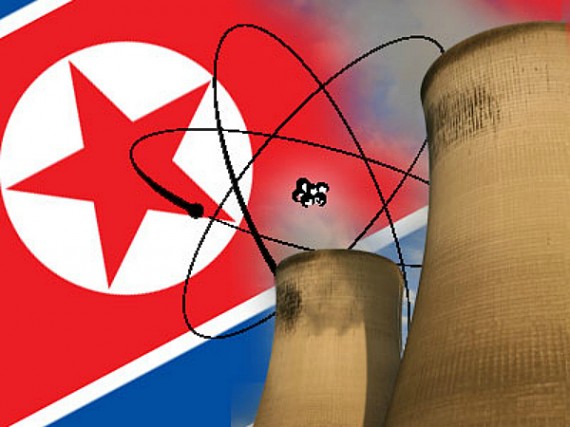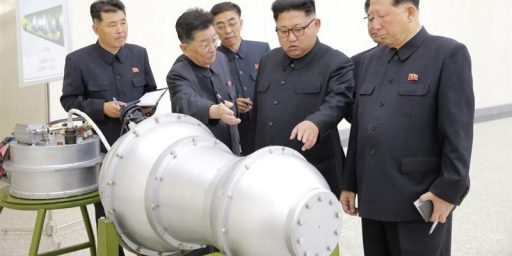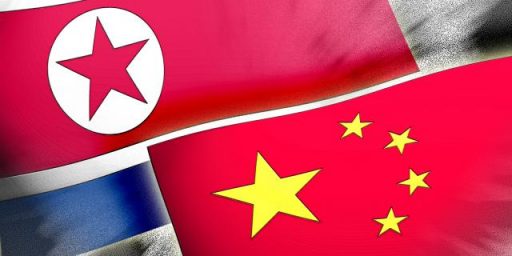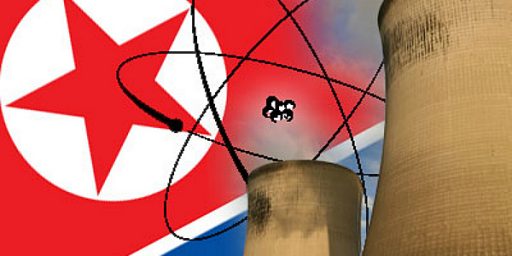Experts Cast Doubt On North Korean Claim That It Tested Hydrogen Bomb
Experts are casting doubt on North Korea's claim that it tested a thermonuclear device earlier this week.
Based on historical data regarding previous underground nuclear tests, experts are doubting that North Korea did in fact test a thermonuclear device as it has claimed:
Military experts said comparisons of underground nuclear tests over the past several decades suggested that the North Koreans were exaggerating their claim on Wednesday to have successfully detonated their first hydrogen bomb.
In 1971, when the United States detonated an H-bomb deep beneath the Alaskan island of Amchitka, the colossal upheaval of earth that it caused was typical for a class of weapons whose destructive power is roughly a thousand times greater than the atom bomb that leveled Hiroshima in 1945.
The H-bomb was detonated more than a mile down. Gargantuan shock waves radiated outward, throwing solid rock and dense earth into bizarre states of fluidity for many miles.
A video of the Alaskan tundra shows hills rising and falling as the giant undulations raced outward. Close-up views show the ground waves throwing rocks and other objects into the air, tearing apart test-site structures, sending cliffs tumbling into the sea and opening wide cracks in roads.
The magnitude of the American blast was 6.8. In contrast, South Korea estimated that the bomb detonated on Wednesday had a magnitude of 4.8 — on the logarithmic scale of earthquake magnitude, an enormous drop in explosive power.
Kenneth W. Ford, an American physicist who worked on the nation’s first hydrogen bomb and last year published an H-bomb memoir, called the North Korean claim highly suspect. “How could a thermonuclear blast trigger such a weak seismic signal?” he said. “I agree with the suspicion that it was not a true H-bomb.”
David Albright, president of the Institute for Science and International Security, a Washington research group, said North Korea “may be bluffing” in making very large claims for what was actually a small atom bomb. “This possibility,” he said, “should be carefully considered.”
South Korean experts put the blast’s energy as equivalent to six kilotons of high explosives. In contrast, the atomic bomb dropped on Hiroshima was nearly three times as powerful, with a force of about 15 kilotons.
Many nuclear experts, including Dr. Kim, Dr. Ford and Mr. Albright, suggested that the North Korean test might have involved putting a tiny amount of tritium, or heavy hydrogen, into the core of an atom bomb. Such a technique is known as boosting.
But such a boosted device, by definition, is not a true H-bomb, even though the added thermonuclear reactions can modestly increase its destructive power.
Philip E. Coyle III, a nuclear expert who directed the Alaskan H-bomb test of November 1971, said the seismic signature of the North Korean test was “low enough so that it will be difficult to tell if the device was boosted, thermonuclear, just fission or whatever.”
The world’s largest and most sensitive network meant to detect nuclear blasts, run out of Vienna by the United Nations, uses hundreds of global sensors to detect underground shock waves, track undersea explosions, sniff the air for telltale radioactivity and listen for loud sounds in the atmosphere.
The array is designed to detect nuclear blasts as small as one kiloton, or equal to 1,000 tons of high explosives.
Deciphering all the signals can take days to weeks, experts say, and even then the clues might not add up to hard conclusions since the work of interpretation is often as much of an art as a science. That uncertainty goes especially to small hydrogen bombs, which seismically can be indistinguishable from atom bombs.
This isn’t final confirmation of what the nature of the test conducted earlier this week actually was, but it certainly seems to be strong circumstantial evidence in favor of the proposition that the the North Korean claim that they detonated a Hydrogen Bomb was most likely false. The biggest giveaway in that regard would seem to be the seismic measurements that resulted from the disturbances that the test created, which have been a typically good way of measuring the intensity of the device that was tested to begin with. As noted, the measurements from the North Korean test were roughly two orders of magnitude below that of the seismic event that was measured when a relatively low-yield thermonuclear device was tested in Alaska in the early 1970s. This suggests that the North Koreans tested something more akin to the devices dropped on Hiroshima and Nagasaki in 1945 than something that represents a significant technological leap forward for them in their nuclear program. It’s possible, of course, that there were aspects to this test that were designed to test methods of weapons design that are meant to lead to thermonuclear weapons, but that’s a far different thing from actually having the technological ability to create such a device at the moment.
Meanwhile, as scientists question the official line out of Pyongyang, there are signs that the test has once again strained North Korea’s relationship with China:
BEIJING — North Korea’s test of a nuclear bomb on Wednesday seemed aimed at antagonizing a familiar adversary, the United States. The army spoke of the need to ward off “imperialist aggressors,” and a television commentator warned that foreigners were intent on destroying the country’s way of life.
But North Korea’s decision also had a more surprising target: China, its neighbor and chief ally for six decades, which had recently sought to forge closer ties.
By proceeding with its nuclear test about 50 miles from the Chinese border, North Korea took a gamble that China, its largest trading partner and economic lifeline, would not react with austere sanctions, as many countries have urged.
In doing so, it dealt a rare setback to President Xi Jinping, who had hoped a charm offensive over the past six months would ensure stability in the North.
“North Korea is just thumbing its nose at China,” said Douglas H. Paal, the director of the Asia program at the Carnegie Endowment for International Peace in Washington. “That’s got to produce a reaction.”
As recently as October, China had received assurances from North Korea that it would stop its nuclear tests. Beijing had agreed to send a senior official to a military parade in the North Korean capital, Pyongyang — the first such visit since Kim Jong-un became leader in 2011 — partly on the condition that the North would refrain from nuclear tests, several American diplomats said.
On Wednesday, officials in Beijing were furious.
“China strongly opposes this act,” Hua Chunying, a spokeswoman for the Ministry of Foreign Affairs, said in unusually harsh remarks at a news conference. “China will firmly push for denuclearization of the Korean Peninsula.”
Mr. Xi is in a difficult position. He is under intense pressure to inflict harsh economic punishment on North Korea, but many Chinese worry that any resulting instability could seep back into their territory. He also faces new questions about China’s efforts to curry favor with Mr. Kim, whom many Chinese regard as a bizarre, bumbling figure.
Mr. Xi must also reckon with the prospect that actions by the North could galvanize countries like the United States, Japan and South Korea into strengthening military forces in the Pacific, just as China is seeking to assert its dominance in the region.
“This is precisely what China does not need,” said Rory Medcalf, head of the National Security College at Australian National University. “If there is one issue guaranteed to refocus U.S. strategic attention on Asia, it is a North Korean nuclear provocation, especially one purported to bring Pyongyang’s destructive capabilities to a whole new level.”
On Wednesday, Chinese officials sidestepped questions about whether they would level economic sanctions against North Korea, by paring shipments of oil, for instance, or food. China is North Korea’s largest economic ally, with trade between the two countries having totaled $6.4 billion in 2014.
Cheng Xiaohe, a professor of international relations at Renmin University in Beijing, said China had several ways of increasing economic pressure, including by limiting the number of tourists allowed to visit North Korea or by reducing Chinese imports of commodities like coal.
But he said the leadership in Beijing should be cautious before resorting to more drastic measures.
“If China unilaterally imposes sanctions, it will have no more tricks,” Professor Cheng said. “Putting more economic pressure on North Korea might also lead to the fall of Kim, the collapse of the regime and all kinds of unpredictable situations China does not wish to see.”
Whenever there’s a crisis or rising tension on the Korean Peninsula, the question of what China might do, or whether Pyongyang may have finally gone too far for the Chinese to continue supporting them, always arises. On the one hand, it often seems clear that the Chinese are close to losing patience with their client state, but it’s also clear that they are reluctant to pull the plug of support for fear of creating a situation where a quick collapse in Pyongyang leads to a reunified Korea that is a close ally of the United States. On the other hand, the Chinese also have obvious concerns that a more aggressive North could lead to a an even closer military relationship between the United States, South Korea, and Japan or, alternatively, military build-ups by South Korea and Japan themselves in response to potential threats from the North. Given that, it’s not surprising that this latest nuclear test would be a problem for Beijing. Whether it will lead them to start putting more pressure on the Kim regime, though, is another question. Indeed, many of the actions that Kim Jong Un has taken in recent years make one wonder just how much influence the Chinese still have. If Pyongyang keeps yanking the world’s chain, we may find out sooner rather than later.






Kim Jong Un reminds me of Donald Trump…if he’s talking he’s lying.
I suspect that the Chinese realize that Kim Jong Un is not the problem. He is little more than a buffonish figurehead who is not involved in decision making or policy decisions. The Chinese may know who is actually in charge but they are not saying. If the West knows they are not saying either. The same probably applies to Kim’s late father.
Of course, telling Kim and/or whoever is really in charge that the latest H-bomb design didn’t work and all they got was explosion of the trigger might not be a good career move in North Korea. It went bang big enough to say it worked, it’s not like Kim is going to know the difference.
What is worse: a state which is a dedicated
enemyopposition, or a client state that regularly disrespects you?“A team of seismological experts from the United States Geological Survey, after careful analysis of the data and simulation of alternative scenarios, issued the following statement:”
“Coke and mentos(tm).”
Seems like a worthy place to drop the observation that it is stunning and amazing that apparently it’s been necessary to explain the difference between ‘ATOMIC’ bombs and ‘HYDROGEN’ bombs. During the cold war the concepts of ‘throw weight’ and ‘megatons’ were practically routine dinner conversation.
@JohnMcC: True. Many of the explanations leave out that there are half way house boosted fission “hydrogen” bombs. Still capable of doing a lot of damage to Seoul.
Even 6 kT is optimistic (pessimistic?), probably closer to 1. Not that it couldn’t entirely ruin your day, but considering they have all the time and space in the world to practice, I’d be surprised if they could fit their crap design into a shipping container…
@gVOR08: It looks like the arguing among the nuclear physicist peanut gallery has been whether the Norks set off a pure plain vanilla A-bomb or whether it was a mildly-boosted bomb.
Whatever it was, it has pissed off China considerably.
The region of North Korea would be a enormous drag in a reunified Korea. The Chinese are afraid about instability and refugees if North Korea fails, not a reunified North Korea that would be sympathetic to the United States.
@Andre Kenji: Actually, it seems to be both. China has appeared to prefer nuclear research NK to Unified RoK for several years. Ironically, some sources that I read while living in South Korea indicated that both Japan and Russia are ambivalent enough about Unified Korea that they are willing to roll the dice on NK nuclear ambitions. Maybe that will change with this event, but community memory is getting shorter the world over.
292,000 new jobs this month.
October and November revised upward by 50,000 jobs.
Can’t wait for the ODS crowd to tell us why that sucks.
@gVOR08:
The North has more than enough artillery within range and aimed at Seoul to wipe it off the map. This is why nobody has ever suggested limited strikes on NK’s nuclear facilities.
@C. Clavin: It looks like at some point China and Europe may drag us down. If it happens, count on the ODS crowd to be crowing that they were right all along and that China’s problems are somehow Obama’s fault.